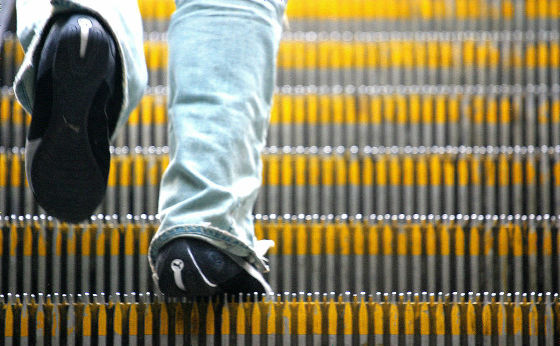A walking smartphone changes the way of walking, and sometimes makes a person stupid

ByClement 127
People who struggle to something in the middle of walking smuggling and injure while falling into a hole, as of 2010, 1,500 people in the USAIt was reportedHowever, as of 2017 the number is increasing further. So, in fact, how does walking smartphone change people 's way of walking? It was investigated by researchers.
The impact of mobile phone use on where we look and how we walk when negotiating floor based obstacles
http://journals.plos.org/plosone/article?id=10.1371/journal.pone.0179802
Texting on a mobile phone makes you walk sillily, study finds | Science | The Guardian
https://www.theguardian.com/science/2017/jun/30/texting-on-a-mobile-phone-makes-you-walk-sillily-study-finds
Professor Matthew Timmis of Angril and Ruskin University who wrote the paper said that when walking on the road during the day, he noticed the pace of pedestrians walking in front of them was very slow and shaking horizontally. Professor Timmis noticed that a pedestrian was touching a smartphone instead of being drunk when thinking "I am drunk early in the morning?" While passing over a pedestrian.
In response to this, the research team of Professor Timmis and colleagues began to investigate how walking smumach affects people's way of walking. I attached an eye tracker and a motion analysis sensor to the head of 21 subjects and asked me to walk on the 5.6 m road with steps made from obstacles and boxes made with fiber board. At this time, the subjects walked the course three times without a smartphone first, then followed the same course in a three-pattern way of "to have a text message written", "to have the message read" and "make a call" I walked.
As a result of experiments, when walking while touching a smartphone, the length of time for subjects to clear the course was 118% in the case without smartphones, the proportion of legs solidifying increased by 60% It seems that the number of times to pay attention decreases. In particular, people are less inclined to avoid risks by "carefully advancing their feet" as the perception of changes in the height of the ground will be diminished. Then, when walking in a manner of "advancing carefully," it turned out that the subjects walked straight rather than walking straight forward. The pedestrian who Timmis saw at the street was in this state. Especially when you are touching a smartphone by "writing a text message", it seems that there has been a strong change in gaze movements and gait

ByThomas Hawk
Also, when you are talking with a smartphone on your ear, you know that you are starting to see other things that are not important, not obstacles, even though you are looking around as you are raising your face .
Furthermore, when examining how the examinee is taking one step, when the smartphone is present compared to the state without the smartphone, the width of one step is 38% shorter, while the height of raising the foot is 18 % That it was high. This is the characteristic when a person is carefully stepping on his feet, and this way people areWorking memoryIt reduces the cognitive burden of the brain, it seems to be able to divide the brain's resources into smartphone operation.
Although no one actually tried to obstacles in this experiment, Professor Timmis said, "People touching smartphones will not be conscious of their surroundings, so they will depend on limited information and will go forward" "When suddenly there appears anyone in front of you, you can not respond well to it, there is a possibility that you are injured," and warned people who are walking around on their smartphone.

ByIvan Rigamonti
Related Posts:
in Mobile, Posted by darkhorse_log







